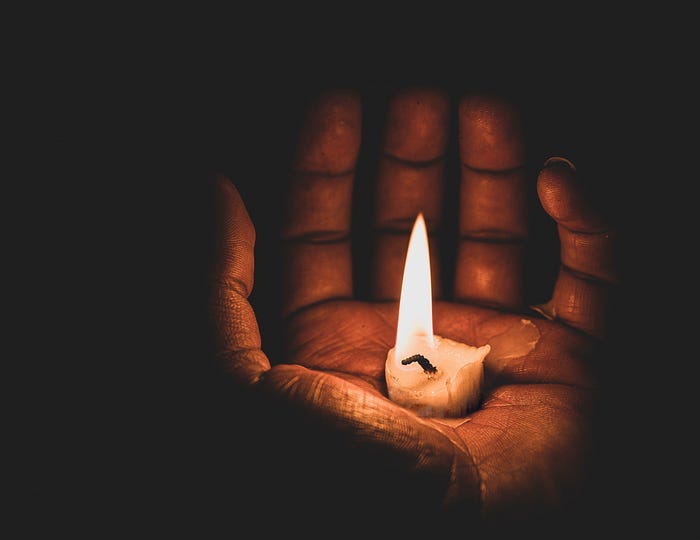The Existential Crisis of A No Longer Needed Caregiver
I took care of her. Now she’s gone. Now what?

(This is the written version of this piece. For an audio version, see this piece on my website.)
I pick up the small urn that holds a portion of my mother’s ashes. I tell her hello and kiss the cool porcelain that has replaced her warm skin. Tears in my eyes, I talk to her.
“You know Mom, I’m glad you aren’t sick anymore. That your spirit is no longer trapped in a brain that couldn’t understand life, or a body that could no longer function. I’m glad that’s over for you. Really, I am. But… I miss taking care of you. As horrible as it was, as painful as it was, it satisfied part of me, you know. Your illness gave my ego purpose. Now, that part of me is floating aimlessly. Lost without task. And I hate that, because how stupid and how selfish.”
And then I break down into a puddle of uncontrollable sobbing, swollen eyes and a snotty nose.
* * * * * *
In the midst of caring for my mother, I spent hours with her every day. I helped her eat, bathe, get dressed, and then cleaned and changed again after incontinence accidents. I paused “my life” (as if one could actually do such a thing…) to ease my father’s caregiver burden, and pick up a piece of my own.
As hard as it was, the role of caregiver alleviated something within me. It quieted the voice that says, “You must do something important and valuable to be important and valuable. You must earn your keep in this earthly realm.”
My mother became my keep. I knew that it would be difficult in all ways, but I told myself that I would rise to the challenge. And rise I did. I remember thinking at the end of an especially challenging day with her, “If caring for Mom and loving her through this illness is the only reason I was ever on this planet, then I am content. I have fulfilled my purpose and been honored to do so.”
But Mom is gone now, and I’m here with how ever much more time on my hands to move through life. The noble and compassionate warrior that awoke for the season of my mother’s illness is wringing her hands. She’s asking, “Do I have another task? Or do I go back to sleep?”
When I was caring for Mom, I saw the best version of myself. It required me to stretch beyond my comfort zone. Past what I thought were my limits. I was forced to become a better person. Not that I was bad to begin with, but I had an awareness of turning into someone who was more loving, patient, caring, compassionate, present, flexible, creative, appreciative. Being this person came with a graciously noble feeling. And I was just getting to know her, when she became unnecessary.
Mom died in July.
Alzheimer’s took her in pieces for 5 years, and then it came for the last of her. It feels like it took her caregiver too. And why wouldn’t it?
It makes me wonder if the best of us only makes an appearance to meet the worst of life. If that’s true, at least there’s that. But where does the best of us go when not called into action? Where is my better person when someone she loves isn’t dying?
No one tells you that meeting the best you, makes ordinary you look dull. It brings a different kind of insecurity.
It makes the time and tasks of life get muddled too. As caregiver, a day was full, complete and successful if Mom was clean and fed. That could take all day, but the amount of time it took was irrelevant. Those were my only priorities, aside from fiercely loving her.
What does one do with oneself when there a thousand minutes stretched ahead and no important things to do? Or a hundred silly tasks and not nearly enough time?
Was existing and getting things done always this complicated? It seemed so simple for the noble and compassionate warrior to care for her mother. But she is overqualified for paying bills, doing dishes, folding laundry. And entirely unqualified to ponder her own existence. There seems no place for her in a life without intensity.
And speaking of intense…
* * * * * *
I exhaust myself from the hard cry and pick myself off the floor. I dry my eyes, blow my nose, and stare out the window at nothing. I wait for the pressure in my face to slowly drain away, like the pressure of the emotions. I pick Mom up, and feel how the curve of the small urn fits perfect and smooth into the palm of my hand. I talk to her again.
“What do I do with myself now, Mom? How do I fill my days? Who do I become, who becomes me?”
I let out an exasperated sigh. It feels both incredibly important and entirely foolish to keep asking all these questions. Most likely, if the answers come at all, it will be when I’m not looking. It will be when I’ve forgotten there was a time when figuring all this out seemed so important.
So, for better or worse, some version of me goes downstairs to do some sort of things.
……..
If you have appreciated this piece, consider purchasing my new book, Love Doesn’t Care If You Forget: Lessons of Love from Alzheimer’s and Dementia
